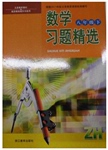题目内容
We have adequate food but ________ to waste.
A.nothing B.all C.none D.enough
C

 习题精选系列答案
习题精选系列答案根据对话内容,从对话后的选项中选出能填入空白处的最佳选项。选项中有两项为多余选项。)
▲请按说明将此题的答案涂在答题卡上
(E涂为AB, F涂为AC, G涂为AD)
--- We have to meet the others at 8:30 at the reserve, don’t we?
--- __________
--- Do you know how to get there?
--- ________ It will take us about two hours to get there by bus.
--- __________
--- It’s an area that protects lots of different animals.
--- ________
--- I’m not really sure. I know there are many different kinds of birds there and I’m going to take my camera with me.
--- That’s a good idea. What clothes are you going to wear?
--- Well. I will wear my strong shoes and take my raincoat with me in case it rains.
--- _________
| How do you know? What kind of animal can we see there? Neither will I. Yes, I’ve got a map. What do you know about it? Yes, that’s right. Me, too. |
“Life is speeding up. Everyone is getting unwell.”
This may sound like something someone would say today. But in fact, an unknown citizen who lived in Rome in AD 52 wrote it.
We all love new inventions. They are exciting, amazing and can even change our lives.
But have all these developments really improved the quality of our lives?
Picture this: You’re rushing to finish your homework on the computer. Your mobile phone rings, a QQ message from your friend appears on the screen, the noise from the television is getting louder and louder. Suddenly the computer goes blank and you lose all your work. Now you have to stay up al l night to get it done. How calm and happy do you feel?
l night to get it done. How calm and happy do you feel?
Inventions have speeded up our lives so much that they often leave us feeling stressed and tired. Why do you think people who live far away from noisy cities, who have not telephones, no cars, not even any electricity often seem to be happier? Perhaps because they lead simpler lives.
One family in the UK went “back in time” to see what life was like without all the inventions we have today. The grandparents, with their daughter, and grandsons Benjamin, 10, and Tomas, 7, spent nine weeks in a 1940s house. They had no washing machine, microwave, computer or mobile phones.
The grandmother, Lyn, said, “It was hard physically, but not mentally.” She believed life was less materialistic. “The more things you have, the more difficult life becomes,” She said. The boys said they fought less to fight over, such as their computer. Benjamin also noticed that his grandmother had changed from being a “trendy(时髦的), beer-drinking granny, to one who cooked things.”
Here are some simple ways to beat the stress often caused by our inventions!
Don’t be available all the time, turn off your mobile phone at certain times of the day. Don’t check your e-mail every day.
Don’t reply to somebody as soon as they leave a text message just because you can. It may be fun at first, but it soon gets annoying.
【小题1】The passage is mainly about .
| A.problem with technology |
| B.improvements of our life with technology |
| C.the important roles technology plays in our everyday life |
| D.major changes which will be likely to happen to technology |
| A.share a truth about life |
| B.tell us what life was like long time ago |
| C.make us wonder what causes such a thing to happen |
| D.point out that you experience some big problems and they may be the same |
| A.they liked to live simple lives |
| B.they were curious about how people lived without modern inventions |
| C.they were troubled by modern inventions |
| D.living in a different time would be a lot of fun for them |
| A.Busy on line | B.Free. | C.Be able to | D.Be found by others. |

